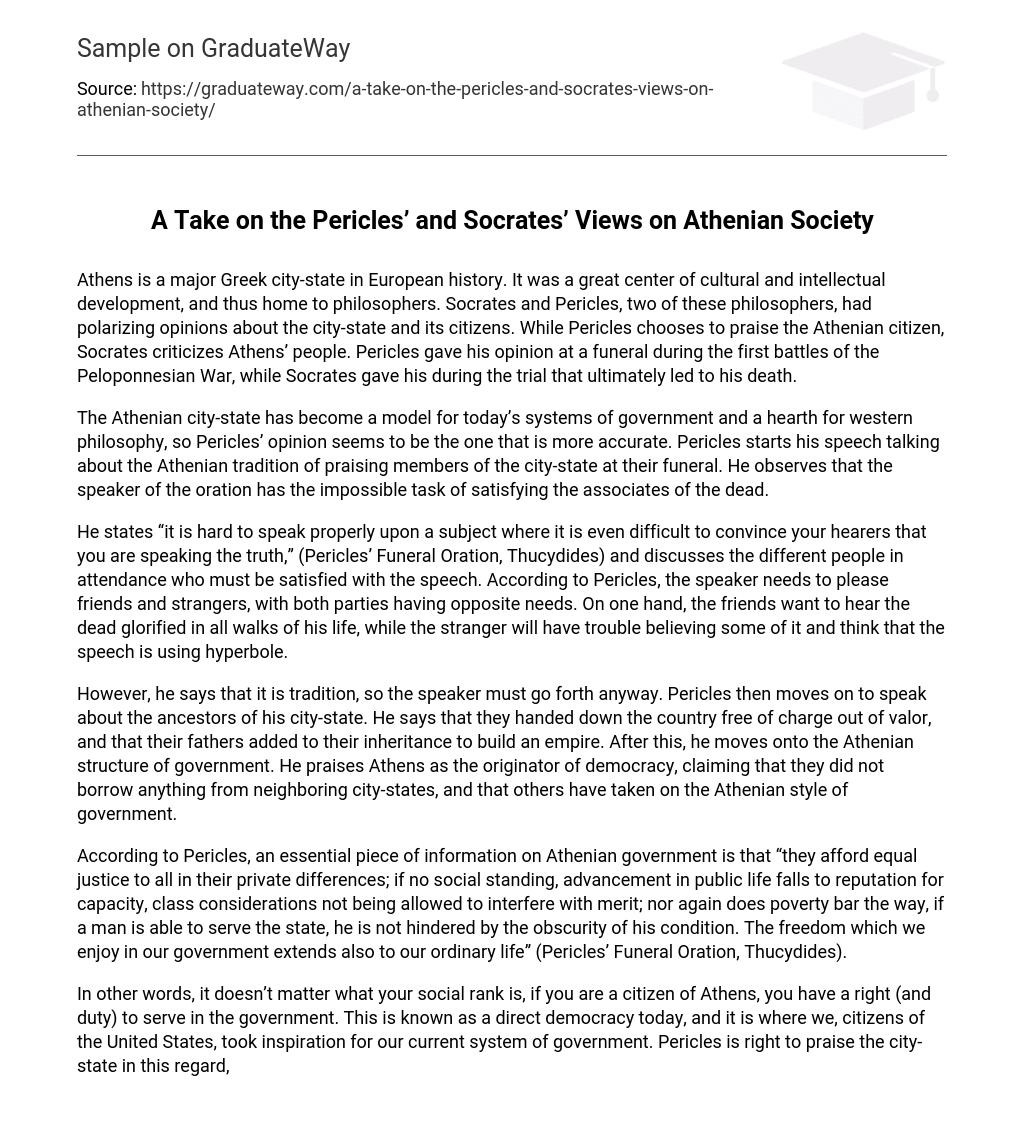Athens, a significant city-state in Greek history, served as a prominent hub for cultural and intellectual progress and was renowned for its philosophers. Notably, Socrates and Pericles were two philosophers with contrasting viewpoints regarding the city-state and its inhabitants. Pericles expressed his admiration for the Athenian citizens during a funeral ceremony held amidst the initial conflicts of the Peloponnesian War. In contrast, Socrates voiced his criticisms of the people of Athens while defending himself during the trial that ultimately resulted in his demise.
Pericles states that the Athenian city-state is admired in contemporary government systems and revered for its contributions to western philosophy. Pericles asserts that his opinion is the most accurate. Furthermore, he begins his speech by discussing the Athenian tradition of giving praise to deceased members of the city-state during their funerals. He acknowledges that the speaker delivering the oration faces the daunting challenge of satisfying the acquaintances of the deceased.
In Thucydides’ text, Pericles speaks about the challenge of communicating truthfully when it is difficult to convince the audience of one’s honesty. He also mentions the diverse audience present at the funeral oration who each have different expectations for the speech. Pericles explains how the speaker must aim to satisfy both friends and strangers, despite their contrasting needs. While friends desire the deceased to be praised in every aspect of their life, strangers may find some of the claims exaggerated and view the speech as employing hyperbole.
Although it is tradition, the speaker must go forth anyway, according to him. Moving on, Pericles discusses the ancestors of his city-state, emphasizing how they inherited a free country through valor and built an empire with the contributions of their fathers. He then shifts to the Athenian government structure, praising Athens for originating democracy without borrowing from neighboring city-states, asserting that others have adopted the Athenian style of government.
According to Pericles, the Athenian government ensures equal justice in private disputes, regardless of social standing. Advancement in public life is based on merit and reputation for capacity, without considering class. Additionally, poverty does not prevent a person from serving the state if they are capable. The freedom in the Athenian government extends to everyday life as well. This information is found in Pericles’ Funeral Oration documented by Thucydides.
In summary, regardless of social rank, all citizens of Athens have the right and duty to serve in the government. This concept, known as direct democracy, served as inspiration for the current system of government in the United States. Pericles praises the lasting impact of Athens’ legacy on the world. On the other hand, Socrates, a critic of Athenian society, also critiques democracy. He believes that Athens, as a democracy where the majority holds political power, is prone to the vices of the many. Socrates himself refused to participate in government due to his fear of imprisonment or death, which ultimately became his fate. However, what if the people’s vices are not severe, or if they don’t hinder objective decision-making?
Socrates argued that the flaws of democracy come from the vices of the many, making people incapable of effectively running a democratic system of government. This perspective remains relevant today, especially as our current democracy is an indirect one, where we elect individuals with sound character to make decisions instead of everyone voting on them. During his trial, Socrates faced charges of corrupting the youth, disrespecting the city-state’s deities, and imposing his own beliefs. Ultimately, he was narrowly convicted and proposed a fine as his punishment.
The jury proceeds to give him the death penalty, a destiny he willingly embraces. In Greek society, a man’s devotion to his city-state was such that he believed he owed the city-state his life (Socrates held the same belief). Socrates then criticizes those who voted against him one final time. He asserts that “if you believe that by killing individuals you can avoid being criticized by your accusers, you are mistaken; such an escape is neither feasible nor honorable; the easiest and most noble path is not to oppress others but to better yourselves” (“Apology,” Plato: translated by Benjamin Jowett).
In this passage, Socrates advises his accusers against trying to eliminate criticism as a solution to their problem. Instead, he suggests that individuals should focus on self-improvement in order to no longer attract critics. This highlights Socrates’ belief that the flaw lies with the character of Athenian citizens in a democratic society. The significance of Athens in our present society lies in its relevance to our own governments. We have borrowed principles from their direct democracy and incorporated them into our modern systems, which acknowledges Pericles’ praise of Athenians for this achievement.
Both Socrates and Pericles had valid points about the relationship between vices and government. Socrates believed that vices of people become a part of government, while Pericles praised the Athenians for their ideas. Socrates cautioned later civilizations to correct what he saw as democracy’s flaw. Today, citizens have a more limited role in government compared to Athenians’ direct role.
Works Cited:
Plato’s “Apology” and Thucydides’ “Pericles’ Funeral Oration” from the Peloponnesian War are two ancient texts that reflect on Athenian society. Socrates’ criticism of democracy is also discussed in these texts.





